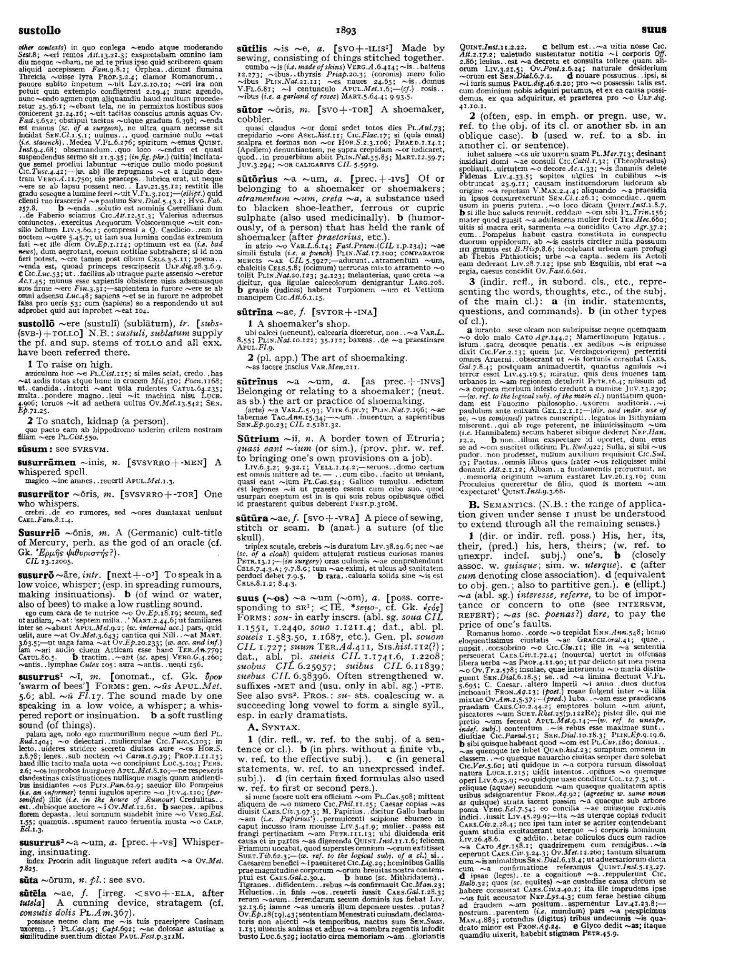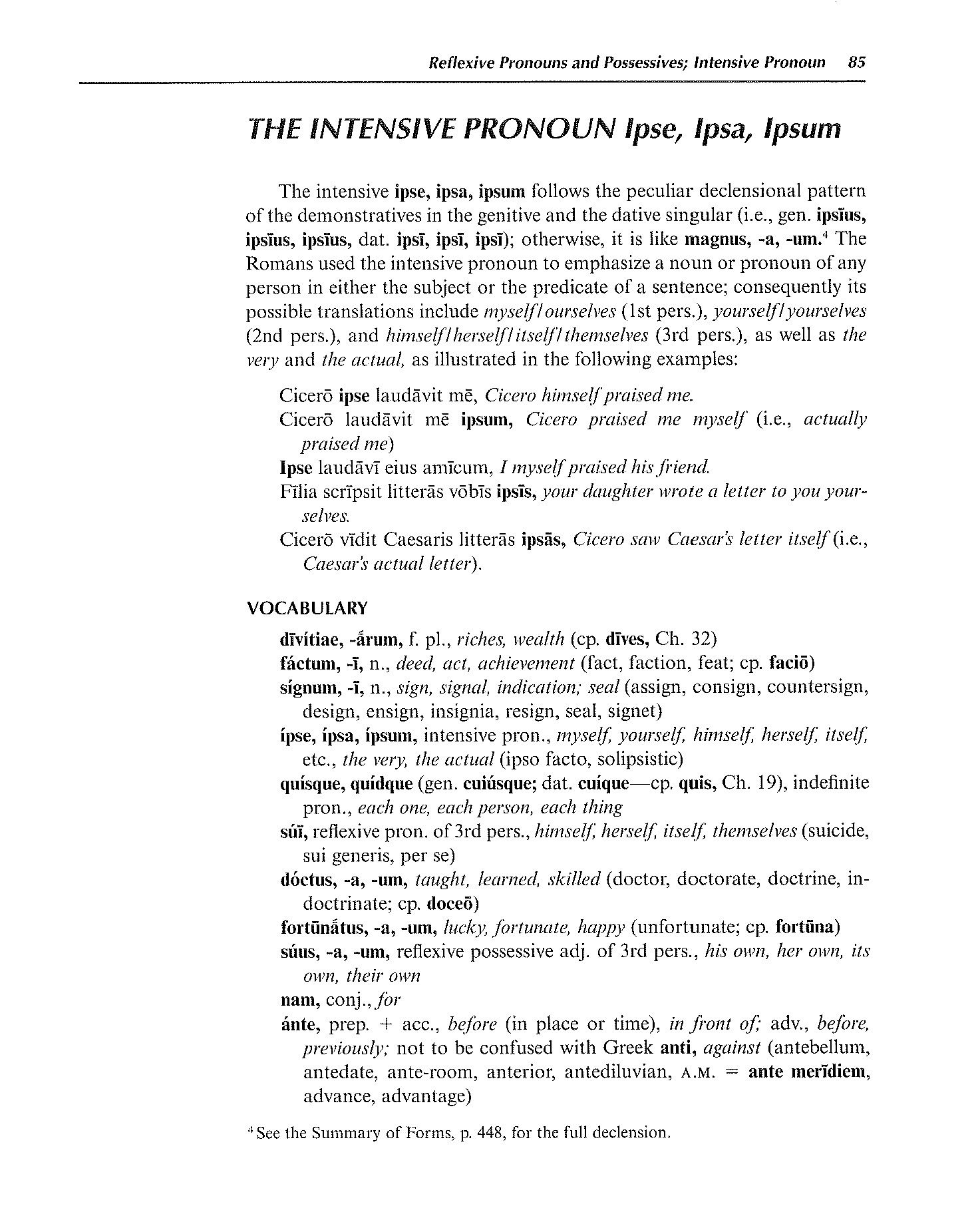
page_listing.tpl
page_subListingDetails.tpl
sub_listingDetails_style1.tpl
sub_listingDetails.title.tpl
suus his
suus is a Latin Adjective that primarily means his.
Definitions for suus
Wheelock's Latin
Adjective
- 1
reflexive possessive adj. of 3rd pers., his own, her own, its own, their own
Oxford Latin Dictionary
Adjective
- 1
SYNTAX. (dir. refl., w. ref. to the subj. of a sentence or cl.). (b) (in phrs. without a finite vb., w. ref. to the effective subj.). (c) (in general statements, w. ref. to an unexpressed indef. subj.). (d) in certain fixed formulas also used w. ref. to first or second pers.).
- 2
SEMANTICS. (N.B.: the range of application given under sense I must be understood to extend through all the remaining senses.) (dir. or indr. refl, poss.) His, her, its, their, (pred.) his, hers, theirs; (w. ref. to unexpr. indef. subj.) one's. (b) closely assoc. w. quisque; sim. w. uterque). (c) after cum denoting close association). (d) (equivalent to obj. gen.; also to partitive gen.). (e) (ellipt.) ~a (abl. sg.) interesse, referre, to be of importance or concern to one (see INTERSVM, REFERT); ~as (sc poenas?) dare, to pay the price of one's faults.
- 3
(in emph. use) His own. (b) (strengthened w. suffixes -pte, -met). (c) (strengthened w. sibi, see further SE; also w. ipsius, ipsorum). (d) (of a movement) self-generated.
- 4
(phrs.): (a) ~a (~apte) sponte, Of his own accord, spontaneously (see also SPONS); app. also ~apte (ellipt.) (b) ~i iuris, ~ae potestatis (in ~a potestate, etc.), (of a member of a family, a city, or sim.) under his or its own jurisdiction or control, independent; sim. ~ae aetatis (of a person) that is of age; ~i iduicii, having an independent mind. (c) (leg.) possidere pro ~o, to hold as one's own (without specific title).
- 5
(of a person, city, etc.) Subject to him, under his jurisdiction or control (often pred.); ~us (et necessarius) heres, an heir who is in the potestas of the testator at the time of the latter's decease. (b) (w. refl. force) under one's jurisdiction or control; in command of one's feelings or faculties.
Sentences with suus
Latin to English
Virō cuius fīliam amās vītam suam commīsit.Compare He entrusted his own life to the man whose daughter you (sg) love.
Senex magnae fāmae ex patriā suā ad senātum nostrum fūgit.Compare An old man of great fame fled from his country to our senate.
Hic vir, quī turpia vitia sua superāvit, fortior est quam dux fortissimus.Compare This man, who has overcome his base faults, is braver than the very brave leader.
Ipsi illi philosophi etiam illis libellis, quos de contemnenda gloria scribunt, nomen suum inscribunt.Compare On the very books in which philosophers tell us to despise fame, they inscribe their names.
Iuris praecepta sunt haec: honeste vivere, alterum non laedere, suum cuique tribuere.Compare The precepts of the law are these: to live honestly. to injure no one, and to give everyone his due.
Tamen nihilum minus sui superior suus iudicium consto puto oportet.Compare Still they thought that they ought no less to abide by their own former decisions.
Fugio, suus magis conscientia quam indicium homo nullus res conscius metuens.Compare He fled, fearing his own conscience rather than the information of men who were privy to nothing.
Adeo facinora atque flagitia sua ipsi quoque in supplicium verterant.Compare So completely has his crimes and infamies recoiled, as a penalty on himself.
Data sources
Notes
- Definitions
- Frederick M. Wheelock, Wheelock's Latin, 6th ed., rev. Richard A. LaFleur (New York, NY: HarperCollins Publishers, 2005): 85.
- P. G. W. Glare, Oxford Latin Dictionary, Vols. 1-8 (Oxford: Clarendon Press, 1982): 1893.
- Word frequencies
- Christopher Francese, "Latin Core Vocabulary," Dickinson College Commentaries, last modified 2014, http://dcc.dickinson.edu.
- Paul B. Diederich, The Frequency of Latin Words and Their Endings, PhD diss., (Columbia University, 1939).
- Louis Delatte, Suzanne Govaerts, Joseph Denooz, and Etienne Evrard, Dictionnaire fréquentiel et index inverse de la langue latine [Frequency Dictionary and Inverse Index of the Latin Language] (Liège, Belgium: Laboratoire d'analyse statistique des langues anciennes de l'Université de Liège [L.A.S.L.A.], 1981): 119.
Bibliography
Allen, Joseph H. Allen and Greenough's New Latin Grammar for Schools and Colleges: Founded on Comparative Grammar. Edited by James B. Greenough, George L. Kittredge, Albert A. Howard, and Benjamin L. D'Ooge. Boston, MA: Ginn & Company, 1903.
Crystal, David. A Dictionary of Linguistics and Phonetics. 6th ed. Oxford, UK: Blackwell Publishing, 2008.
Delatte, Louis, Suzanne Govaerts, Joseph Denooz, and Etienne Evrard. Dictionnaire fréquentiel et index inverse de la langue latine [Frequency Dictionary and Inverse Index of the Latin Language]. Liège, Belgium: Laboratoire d'analyse statistique des langues anciennes de l'Université de Liège (L.A.S.L.A.), 1981.
Diederich, Paul B. The Frequency of Latin Words and Their Endings. PhD diss., Columbia University, 1939.
Francese, Christopher. "Latin Core Vocabulary." Dickinson College Commentaries. Last modified 2014. http://dcc.dickinson.edu/latin-vocabulary-list.
Gildersleeve, Basil L., and Gonzales Lodge. Gildersleeve's Latin Grammar: Third Edition, Revised, and Enlarged. 3rd ed. London, England: Macmillan and Co., 1903.
Glare, Peter G.W. Oxford Latin Dictionary. Vols. 1-8. Oxford, England: Clarendon Press, 1982.
Krüger, Bernd. "Latin Conjugation Tables." Cactus2000. Accessed May 5, 2023. https://latin.cactus2000.de/index.en.php.
Pierson, Nick. "Sound of Text." Accessed October 26, 2019. https://soundoftext.com.
Wheelock, Frederick M. Wheelock's Latin. 6th ed. Revised by Richard A. LaFleur. New York, NY: HarperCollins Publishers, 2005.
Wiktionary Contributors. "Victionarium." Wikimedia Foundation, Inc. Updated March 18, 2019. https://la.wiktionary.org/wiki/Victionarium:Pagina_prima.
Citation
Chicago (17th ed.)
Allo Contributors. "suus, sua, suum (adj.) - Latin Word Definition." Allo Latin Dictionary. Last modified . Accessed January 30, 2026. http://ancientlanguages.org/latin/dictionary/suus-sua-suum.
Entry created on . Last updated on .








